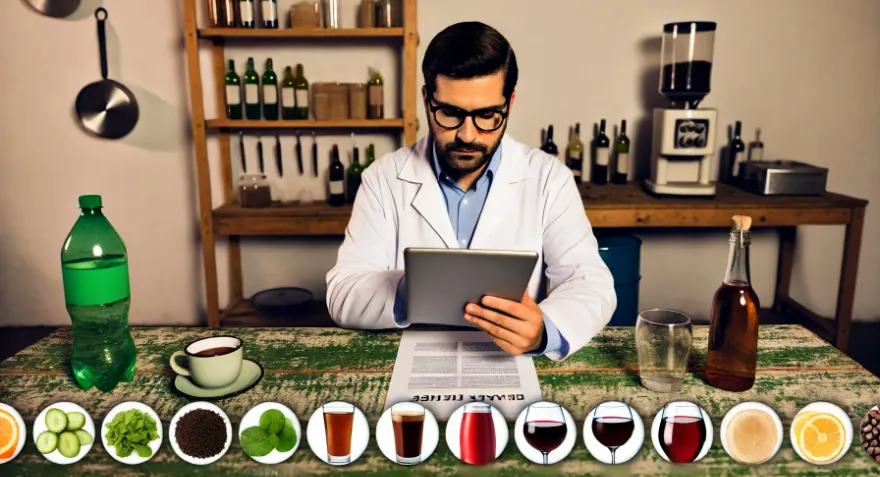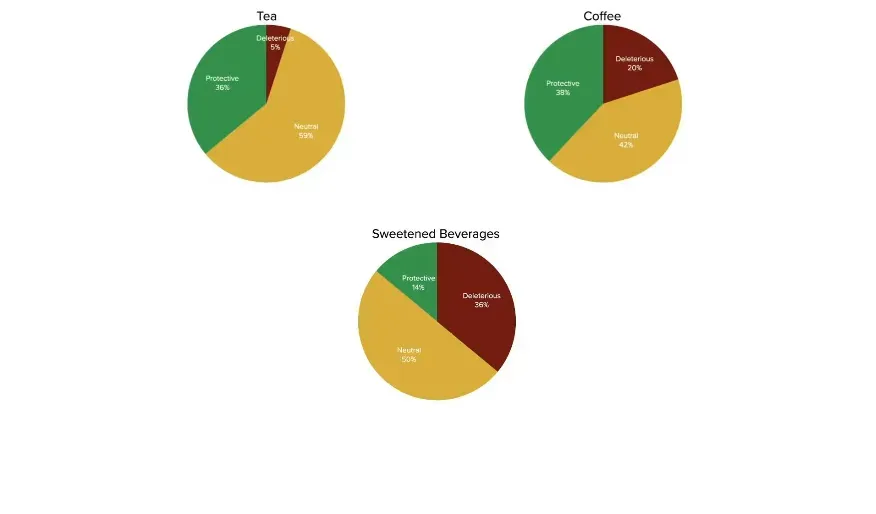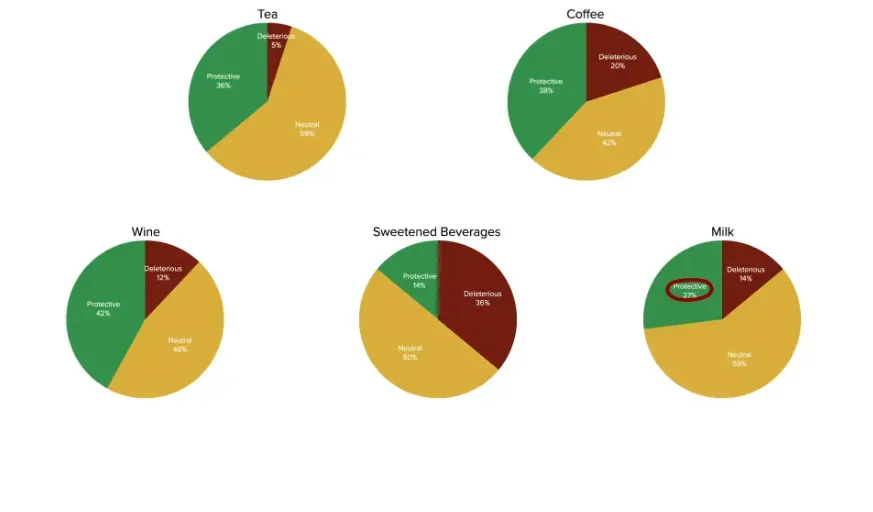What Are the Best Beverages for Health? Discover the Evidence-Based Choices

Understanding which beverages are best for your health can be overwhelming with all the conflicting advice out there. This article aims to clarify these choices by reviewing scientific evidence, emphasizing meta-analyses, and addressing the influence of industry-funded research on study outcomes.
The Importance of Reviewing Scientific Evidence
Scientific evidence is the cornerstone of making informed health decisions. By focusing on the best available balance of evidence, we can make more reliable choices for ourselves and our families.
Understanding the Balance of Evidence
When determining the healthiest beverages, it's crucial to consider the totality of peer-reviewed science rather than relying on isolated studies. This concept, known as the “best available balance of evidence,” provides a more accurate picture of the true impacts on health.
- Individual Studies vs. Meta-Analyses: While individual studies can sometimes capture headlines, their isolated findings may not tell the full story. Meta-analyses compile data from multiple studies, offering a robust overview that mitigates individual biases and limitations. For instance, understanding the link between secondhand smoke and lung cancer is better achieved through meta-analyses than by focusing on single studies.
- Why Comprehensive Reviews Matter: Comprehensive reviews aggregate data from numerous studies, presenting a clearer and more nuanced understanding. This method helps paint an accurate picture, eliminating outliers and providing a more comprehensive perspective on health impacts.
The Role of Industry Funding in Research Outcomes
Not all scientific reviews are created equal, and industry funding can significantly skew research outcomes. For example, studies funded by the tobacco industry often concluded that secondhand smoke was harmless, directly contradicting independent reviews.
- Industry Influence: Reviews funded by tobacco companies were 88 times more likely to downplay the dangers of secondhand smoke compared to independent studies. This highlights the necessity of scrutinizing the funding sources of research.
- Undeclared Conflicts of Interest: Industries often use tactics like failing to declare conflicts of interest, making it challenging to assess the objectivity of the research. Despite these challenges, independent reviews consistently conclude that secondhand smoke is harmful, emphasizing the importance of looking at the broader body of evidence.
The Case of Secondhand Smoke: Lessons for Dietary Choices
The conflicting conclusions seen in secondhand smoke studies offer valuable lessons for navigating dietary choices. This section explores how these lessons can help us make better-informed decisions about what we consume.
Conflicting conclusions in reviews extend beyond tobacco, impacting many areas of health research, including dietary choices. Understanding these conflicts is crucial for making informed nutritional decisions.
Conflicting Review Conclusions
Conflicting conclusions are common in scientific research, especially when industry funding is involved. For example, while some reviews found that secondhand smoke is a cause of lung cancer, others, often funded by the tobacco industry, claimed the opposite.
- Deliberate Confusion: The tobacco industry used conflicting conclusions as a deliberate strategy to create doubt and confusion, making it harder for the public to discern the truth. This tactic is also seen in nutritional research.
- Meta-Meta-Analyses for Clarity: One effective method to resolve these conflicts is by examining meta-meta-analyses. These comprehensive reviews synthesize findings from multiple meta-analyses, offering a higher-level perspective that can help clarify where the best available balance of evidence lies.
Comprehensive Reviews for Clearer Insights
Comprehensive reviews are invaluable when examining the health effects of various foods and beverages. They offer a balanced and accurate perspective, which is essential for making healthier dietary choices.
- Review of Multiple Meta-Analyses: A review of multiple meta-analyses on the associations between different beverages and major diet-related chronic diseases can offer a more reliable perspective than any single study. These reviews classify findings into protective, neutral, or deleterious categories, providing a clearer understanding of overall health impacts.
- Mitigating Biases: By focusing on the collective evidence, these comprehensive reviews help identify the true health effects of various beverages. This method mitigates the biases present in individual studies, offering a more balanced and accurate picture.
Analyzing Beverages Through Scientific Reviews
Examining the health benefits and risks of various beverages through scientific reviews can help us make better-informed choices. This section delves into the detailed findings from comprehensive reviews on common beverages like tea, coffee, soda, and alcohol.

Tea and Coffee
Tea and coffee have both been studied extensively for their health benefits, with generally positive results. However, there is a subtle yet significant preference for tea, particularly green tea, over coffee.
- Protective Effects: Numerous studies have highlighted the protective effects of both tea and coffee against various conditions. However, tea, especially green tea, is often preferred because it offers additional health benefits.
- Green Tea vs. Coffee: Choosing green tea over coffee can maximize health benefits. For instance, green tea has been shown to protect against heart disease and certain types of cancer, making it a more advisable choice for those looking to improve their health through beverage choices.
Soda: The Good, the Bad, and the Misleading
Soda often receives criticism for its negative health impacts, and while some studies show protective effects, these findings are usually misleading due to flawed study designs.
- Misleading Studies: A cross-sectional study found that 8th-grade girls who drank more soda were skinnier than those who drank less. However, this finding can be attributed to flawed study designs or confounding factors, such as heavier girls drinking less soda in response to their weight.
- Long-Term Risks: The broader evidence links soda consumption to numerous health risks, including obesity, diabetes, and cardiovascular disease. Therefore, any potential short-term benefits are vastly outweighed by the long-term health risks, making soda a less favorable choice.
Alcohol: Re-evaluating Its Health Benefits
The perception of alcohol, particularly moderate drinking, as beneficial for health has been widely debated. Recent research challenges the notion that moderate alcohol consumption offers significant health benefits.
- Overstated Benefits: Early studies suggested that moderate alcohol consumption, especially red wine, could protect against heart disease. However, more recent research indicates that these benefits are significantly overstated. A systematic error of misclassifying former drinkers as lifelong abstainers has skewed the results.
- Updated Evidence: The latest evidence suggests that even moderate drinking may increase the risk of certain cancers and other serious health conditions. Therefore, re-evaluating alcohol consumption and considering healthier alternatives is advisable for those looking to make better health choices.
Conflict of Interest in Beverage Studies
Industry funding can significantly influence the outcomes of beverage studies. This section explores how such conflicts of interest can skew research findings and affect public perception.
The Influence of Funding on Study Outcomes
The influence of industry funding on research outcomes is a pervasive issue in beverage studies. Research funded by companies like Coca-Cola often produces results that favor their products, despite broader evidence indicating otherwise.
- Coca-Cola Funded Research: Studies funded by Coca-Cola have often shown favorable results for soda consumption, highlighting the influence of funding sources on research outcomes. This makes it challenging for consumers to discern the true health impacts.
- Dairy Industry: Similarly, studies funded by dairy councils are more likely to report positive health effects associated with milk consumption. This funding bias underscores the importance of critically evaluating the sources of research funding.
Potential Legitimate Benefits of Milk
Despite funding biases, it's essential to recognize legitimate health benefits where they exist. Milk, for example, has shown protective effects against certain conditions, but these benefits must be weighed against potential risks.
- Relative Benefits: Those who drink more milk might consume less soda, which is even worse for health, making milk appear more beneficial by comparison. This relative benefit is crucial for understanding milk's protective effects.
- Biologically Plausible Benefits: There are plausible reasons for milk's protective effects, particularly concerning bone health due to its calcium content. However, it's essential to balance these benefits against potential risks, such as an increased risk of prostate cancer associated with high milk consumption.
Exploring the Health Impacts of Various Beverages
The health impacts of various beverages extend beyond just their immediate effects. This section explores surprising protective associations and the importance of balancing dairy consumption with plant-based alternatives.
Protective Associations and Biological Plausibility
The concept of protective associations can lead to surprising findings. For example, nicotine has shown a protective association with Parkinson's disease, despite its well-documented harmful impacts.
- Surprising Findings: More than 50 studies have consistently found a protective association between nicotine and Parkinson's disease. Even secondhand smoke has shown potential protective effects, although the risks of lung cancer, heart disease, and stroke far outweigh these benefits.
- Biological Plausibility: Understanding the biological plausibility behind these associations is crucial. While some compounds in harmful substances like tobacco may offer protective effects against specific conditions, they generally come with severe health trade-offs. This principle also applies to certain beverages.
Balancing Dairy Consumption with Plant-Based Alternatives
Milk consumption has been associated with both increased and decreased risks for different types of cancers. For example, while milk may increase the risk of prostate cancer, it has been found to decrease the risk of colorectal cancer, likely due to its calcium content.
- Balancing Risks and Benefits: This dual nature of milk's health impacts necessitates a balanced approach to its consumption. Those at risk of specific cancers should consider these nuances when making dietary choices.
- Plant-Based Alternatives: Fortunately, plant-based alternatives offer a way to reap the benefits of milk without the associated risks. High-calcium foods like greens and beans can provide the necessary nutrients while minimizing health risks. Incorporating these plant-based foods into the diet allows individuals to achieve the best of both worlds.
Conclusion
The best beverages for health are those backed by comprehensive scientific evidence indicating protective effects. This section summarizes the key findings and offers practical advice for making healthier beverage choices.
The Best Beverages According to Scientific Evidence
In summary, the healthiest beverages are those supported by a robust body of scientific evidence. Tea, particularly green tea, stands out for its numerous health benefits, making it a preferable choice over coffee. Similarly, while some studies show protective associations for soda and alcohol, the broader evidence points to significant health risks, making these less advisable choices.
- Healthiest Choices: For those looking to optimize their beverage choices, focusing on plant-based and minimally processed options is a wise strategy. Green tea, herbal teas, and beverages rich in antioxidants offer healthier alternatives to sugary sodas and alcoholic drinks.
- Making Informed Decisions: Making informed decisions based on comprehensive scientific reviews is key to achieving better health outcomes. By prioritizing beverages backed by strong scientific evidence, individuals can make choices that support their long-term health and well-being.
Importance of Reviewing Comprehensive Scientific Evidence
Ultimately, the importance of reviewing comprehensive scientific evidence cannot be overstated. Relying on individual studies or industry-funded research can lead to misleading conclusions and poor health choices. By focusing on meta-analyses and reviews of reviews, individuals can obtain a clearer, more reliable understanding of the health impacts of various beverages.
- Better Health Outcomes: Incorporating these evidence-based insights into daily habits can significantly improve overall health and well-being. Whether it's choosing green tea over coffee or opting for plant-based milk alternatives, informed decisions rooted in the best available balance of evidence will always serve as the best guide to a healthier life.
- Continual Learning: Staying updated with the latest scientific reviews and recommendations is essential for making the best dietary choices. As new research emerges, being open to adjusting habits based on the most reliable evidence will ensure ongoing health improvements.
By integrating these comprehensive insights into your daily routine, you can confidently choose beverages that contribute positively to your health, setting a foundation for a longer, healthier life.
References:
- Aune D, Navarro rosenblatt DA, Chan DS, et al. Dairy products, calcium, and prostate cancer risk: a systematic review and meta-analysis of cohort studies. Am J Clin Nutr. 2015;101(1):87-117.
- Vasconcelos A, Santos T, Ravasco P, Neves PM. Dairy Products: Is There an Impact on Promotion of Prostate Cancer? A Review of the Literature. Front Nutr. 2019;6:62.
- Veettil SK, Ching SM, Lim KG, Saokaew S, Phisalprapa P, Chaiyakunapruk N. Effects of calcium on the incidence of recurrent colorectal adenomas: A systematic review with meta-analysis and trial sequential analysis of randomized controlled trials. Medicine (Baltimore). 2017;96(32):e7661.
- Gonzales JF, Barnard ND, Jenkins DJ, et al. Applying the precautionary principle to nutrition and cancer. J Am Coll Nutr. 2014;33(3):239-46.

